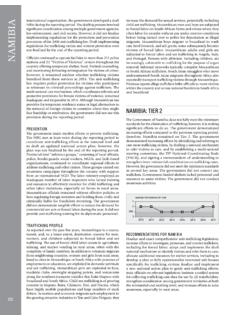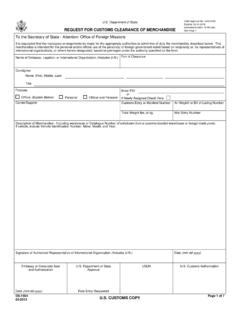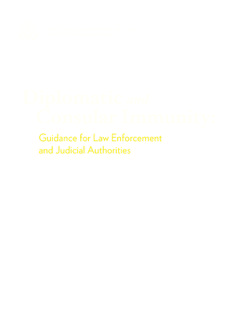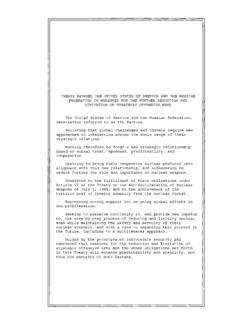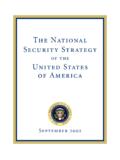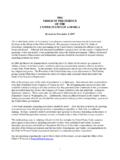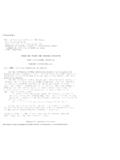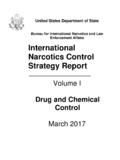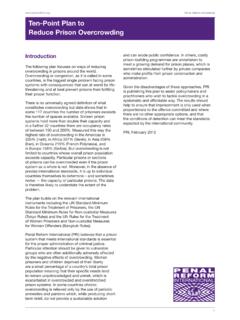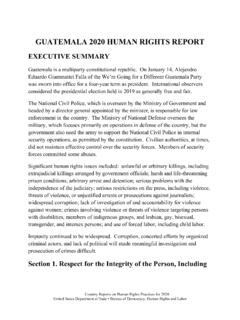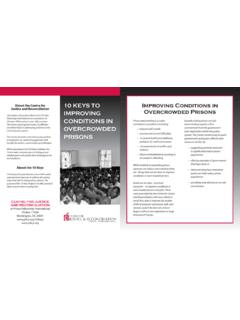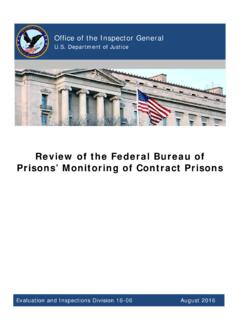Transcription of EL SALVADOR 2020 HUMAN RIGHTS REPORT
1 EL SALVADOR 2020 HUMAN RIGHTS REPORT . EXECUTIVE SUMMARY. El SALVADOR is a constitutional multiparty republic with a democratically elected government. In February 2019 voters elected Nayib Bukele as president for a five- year term. The election was generally free and fair, according to international observers. Free and fair municipal and legislative elections took place in 2018. The National Civilian Police, overseen by the Ministry of Justice and Public Security, is responsible for maintaining public security. The Ministry of Defense is responsible for maintaining national security. Although the constitution separates public security and military functions, it allows the president to use the armed forces in exceptional circumstances to maintain internal peace and public security when all other measures have been exhausted. The military is responsible for securing international borders and conducting joint patrols with the civilian police.
2 In November 2019 President Bukele signed a decree authorizing military involvement in police duties. The decree, in effect until December 31, authorizes the military under National Civilian Police control to identify areas with the highest incidence of crime to target peacekeeping operations; conduct joint patrols with police to prevent, deter, and apprehend members of organized crime and common crime networks; carry out searches of individuals, vehicles, and property; help persons in cases of accidents or emergencies; make arrests and hand over detainees to police; prevent illegal trafficking of goods and persons at unauthorized national borders; strengthen perimeter security at prisons and other detention centers and schools; and provide land, sea, and air support to police. Civilian authorities at times did not maintain effective control over security forces. Members of the security forces committed some abuses.
3 On February 9, the executive branch used security forces to attempt to interfere with the independence of the legislature. Significant HUMAN RIGHTS issues included: allegations of unlawful killings of suspected gang members and others by security forces; forced disappearances by military personnel; torture and cases of cruel, inhuman, or degrading treatment or punishment by security forces; harsh and life-threatening prison conditions;. arbitrary arrest and detention; serious problems with the independence of the judiciary; serious restrictions on free expression and the press; serious acts of government corruption; lack of consistent investigation and accountability for violence against women; and crimes involving violence by security forces against lesbian, gay, bisexual, transgender, and intersex individuals. EL SALVADOR 2. Impunity persisted despite government steps to dismiss and prosecute abusers in the security forces, executive branch, and justice system.
4 In some cases authorities investigated and prosecuted persons accused of committing crimes and HUMAN RIGHTS abuses. Organized criminal elements, including local and transnational gangs and narcotics traffickers, were significant perpetrators of violent crimes. They committed killings and acts of extortion, kidnapping, HUMAN trafficking, intimidation, and other threats and violence. They directed these acts against police, judicial authorities, the business community, journalists, women, and members of vulnerable populations. Section 1. Respect for the Integrity of the Person, Including Freedom from: a. Arbitrary Deprivation of Life and Other Unlawful or Politically Motivated Killings There were no reports that the government or its agents committed politically motivated killings. There were reports, however, of security force involvement in extrajudicial killings of suspected gang members.
5 The Attorney General's Office (FGR) investigates whether security force killings were justifiable and pursues prosecutions. According to the FGR, as of August 24, there were seven extrajudicial killings under investigation in which nine National Civilian Police (PNC) officers were implicated, including cases that originated in past years. As of August 27, the Office of the HUMAN RIGHTS Ombudsman (PDDH) announced it was investigating six complaints of such killings, some by law enforcement, including those in which PNC officers were alleged to have directly participated and one attributed to prison guards. On April 26, President Bukele responded, via Twitter, to an increase in gang- related homicides, stating, the use of lethal force is authorized for self-defense or for the defense of the lives of Salvadorans. This tweet did not grant police any additional powers, although international civil society and multilateral organizations criticized the president for heightening the risk that police would commit extrajudicial killings of gang members.
6 On July 9, the news agency EFE. reported that the official figures from Minister of Security Rogelio Rivas indicated that from January to late May, there were 90 confrontations between security forces and alleged gang members, leaving 44 persons dead, 29 injured, and 70. detained. Country Reports on HUMAN RIGHTS Practices for 2020. United States Department of State Bureau of Democracy, HUMAN RIGHTS and Labor EL SALVADOR 3. On May 13, media outlets reported the case of a woman killed by PNC officers while she was shopping in San Julian Municipality, Sonsonate Department. According to police reports, the woman was a gang member who attacked three police officers with a firearm, and in response, the officers returned fire and killed the woman. The newspaper El Diario de Hoy reported police sources did not find it credible that the woman attacked police, and the woman's family denied she was involved with gangs.
7 The police officers faced an initial hearing before the justice of the peace of San Julian. Per the request of the FGR, the judge decided the officers would continue to face the judicial process but without being detained in prison . On August 13, the FGR arrested three PNC officers who were allegedly linked to an extermination group accused of murdering three persons in July 2019. On August 16, the Specialized Court of Instruction C of San SALVADOR , at the request of the FGR, announced a sentencing hearing for four PNC officers accused of forced disappearances and aggravated homicide. Three of the officers worked in rural Usulutan and the fourth in Zacatecoluca, La Paz Department. According to media reports, the officers were charged with a triple homicide that occurred on July 7, as well as prior homicides from 2017 and 2019. On June 20, media reported that V ctor David Castillo Campos, an officer of the elite Police Reaction Group (GRP) and alleged accomplice in the killing of fellow GRP member Carla Ayala after a GRP gathering in 2017, received house arrest after serving two years in prison without a final verdict.
8 Castillo Campos was arrested in 2018 and was one of 13 defendants (eight police officers and five civilians) implicated as accomplices in Ayala's killing. Juan Jose Castillo Arevalo was also accused of killing Ayala and since 2017 remained a fugitive. The PNC. disbanded the GRP in 2018. In July the Institute for HUMAN RIGHTS at the University of Central America (IDHUCA), Servicio Social Pasionista, Cristosal, Due Process of Law Foundation, and other organizations presented a REPORT on extrajudicial killings that was a follow-up to the UN special rapporteur's 2018 recommendations. On July 9, EFE. stated the REPORT concluded extrajudicial killings persisted in the country despite a change of the presidency in June 2019. According to the REPORT , from June to December 2019, there were 156 clashes between the security forces and alleged gang members that left 107 civilians dead and 43 injured.
9 Country Reports on HUMAN RIGHTS Practices for 2020. United States Department of State Bureau of Democracy, HUMAN RIGHTS and Labor EL SALVADOR 4. b. Disappearance Reports alleged that security and law enforcement officials were involved in unlawful disappearances. Law enforcement agencies had not released data on disappearances since 2017, citing a discrepancy between data collected by the PNC. and the FGR. Media reported in March that the discrepancy continued. According to media reports, the FGR recorded 542 disappearances between January and March, with an average of six missing persons cases per day. This marked a decrease from the same period in 2019 when the FGR tracked 829 cases, equivalent to nine disappearances daily. The PNC reported that 65 percent of those reported missing were later found alive and that there was a likelihood that many of the remaining 35 percent had emigrated.
10 The FGR reported 724 cases of deprivation of liberty through July 13, compared with 2,234 cases from January through October 2019; however, this offense included both disappearances and missing persons. On August 10, media reported that the PNC registered 728 missing persons cases in the first half of the year, compared with 1,295 reported during the same time period in 2019. Of the cases reported in the first six months, 56 percent were still missing as of September, 40 percent were found alive, and 4 percent were found deceased. The local nongovernmental organization (NGO) Servicio Social Pasionista reported that as of June there were 434 disappearances, compared with 652 in 2019. c. Torture and Other Cruel, Inhuman, or Degrading Treatment or Punishment The law prohibits such practices, but there were reports of violations. As of August 27, the PDDH had received 15 complaints of torture or cruel or inhuman treatment by the PNC and two by the armed forces, compared with 33 and nine complaints, respectively, as of August 2019.

